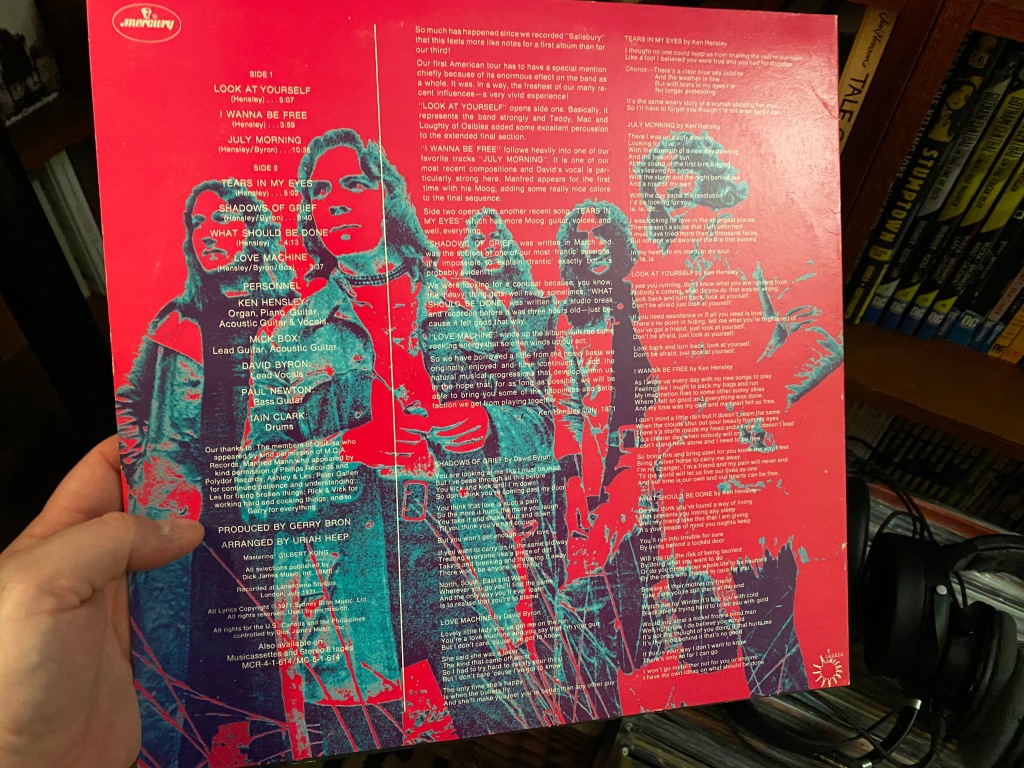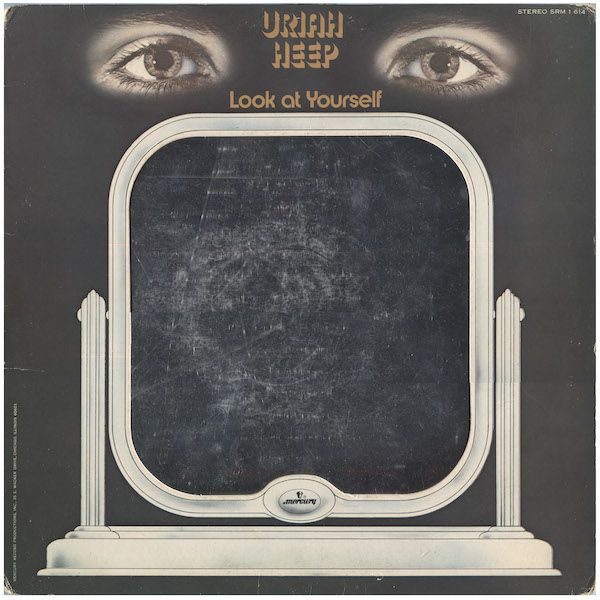It’s another late night. We’ve switched from scotch to red wine, but we’re ready to continue down the track by track path of the monster that is 70s hard rock. Uriah Heep may have solidified their classic lineup and earned their biggest hit to date with “Easy Living'” on 1972’s Demons and Wizards, but the real hard rock punch came a year earlier with the mesmerizing Look at Yourself. The progressive side hasn’t yet fully come into its own; instead we get pounding guitars and organs and an overall more metal release. I was thrilled to find a great copy – a first US pressing at my local shop Needle + Groove for a song. A few listens convinced me of its merit, and for a while I was happy to say it was my favorite of their releases I had heard to date. Now that I had a serious dive into the followup, let tear this sucker up track by track and still if my assessment still holds true.
They may not have had their “classic” lineup yet, but those drums by Iain Clark that kick off the opening title track show the band was in excellent hands in the rhythm department. Once the organ enters with its rapid fire staccato riffing you know this is going to be Ken Hensley’s show, and the way the song relies on his presence as well as those driving drums and solos (Mick Box is a demon on this) immediately signal the band is pushing further into the metal in a similar fashion to their UK peers Deep Purple. The ending is a percussive dream, and turning the vinyl up and getting some serious headphones* show how the production by Gerry Bron really makes great use of the stereo soundstage.
“I Wanna Be Free” showcases the vocal prowess of David Byron, and I can’t get over his ability to match the purity of his voice with the grit of the guitars. There are some psychedelic moments (and some serious wah overload) that ease the rock tension a bit, and Hensley eases off his keyboard attack just enough to let the song move forward as a triumphant march. The one thing I am missing two songs into Look at Yourself is the dextrous bass playing of Gary Thain. Paul Newton aquits himself fine here, but it’s much more of a supporting role, and doesn’t stand out like I want it to.
If there’s an epic to the album it’s the closer for Side A, “July Morning.” Once again opening with Hensley’s organ it’s a more somber affair, even as Box brings a classic solo into the main riff. It’s another powerful showcase for David Byron. Lyrically it’s all lonely love and aches and background chores of “la la las” but there’s an edge that keeps from from devolving into the hippy trippy psychedelia of the late 60s. Although I question Byron’s ear shattering “las” at the song’s midway point, I DO NOT question the synth chaos that closes the track out. Manfred Mann, ladies and gentlemen…
It takes getting all the way to Side B before the blues rock rears its head, but raise it does on “Tears in My Eyes” with some slide guitar and a boogie pace. It’s another Hensley penned track, and between this and his writing on Side A you can see how versatile his skills were, and how broad the band’s interests could be. Once again, I could maybe do without the “la la la la las” but at least they’re couched in some wonderful guitar work.
“Shadows of Grief” is the second epic of the album, coming in at over eight and a half minutes. This is where the prog rock shades really start to come alive. For all its uh, girth, “July Morning” is a fairly straight ahead rocker, whereas here we get some real great progressive moments in the way Hensley attacks the keyboards during the opening and verses. Tonally it still falls in a blues rock vein, but finally we start to hear the bass come alive, and of course everyone else is firing on all cylinders – Iain Clark really feels integrated on the drums, and Hensley and Box push it forward attack with their respective instruments. Aside from the 1-2 punch of the opening track and “I Wanna Be Free” this is the highlight of Look at Yourself for me. Love those panned vocals, and the massive solo excursion. It’s excessive in all the right ways…
I’m not sure what to think about “What Should Be Done” right now. It’s a softer, almost soulful R&B tune that has some great funky wah from Box and a purring, almost slinky vocal from Byron, using a higher register. It’s by far the most divergent song on the the album, and I’m okay with that. I wonder what folks who were following the band at the time thought – were fans more accepting of changes in tone and style from their bands? Or were they as rabid in their opinions as they are now, 50 years later?
All things have to end, and Uriah Heep make sure to end Look at Yourself with a bang. The first thing that comes to mind hearing the rock assault of “Love Machine” is Rainbow, strangely enough. There’s a Dio vibe to the way Byron handles the vocals, and a dirty boogie blues attack that reminds me of Blackmore. Interesting that “Love Machine” is the track that had the most band input, with the songwriting being attributed to Hensley, Byron, and Box.
I get it. I get why upon the first couple listens this was my favorite of the Uriah Heep I listened to. It’s heavy, it rocks, and it feels like a direct line to the metal I fell in love with as a youth a decade later. Look at Yourself has so much going for it, and at this point I can’t tell if this or Demons and Wizards is pinned to my heart as the best.
And yet…last night as I fell asleep I turned to The Magician’s Birthday and DAMN if I wasn’t feeling the love there, too. Too bad I don’t own a copy of that…
…yet.

* for this particular listening session I was using my Grado RS2e reference series headphones. Gorgeous, wood cans with a stellar soundstage and very little ear fatigue.


Great album – nice review.
LikeLike
Listening to Look at Yourself while appreciating your song by song review of same. I came across this album and band via the BBC series Life on Mars, which has a killer Brit metal soundtrack. “Love Machine” drew me in, but the $5 special at my local used record store pulled me under. Cheers.
LikeLike